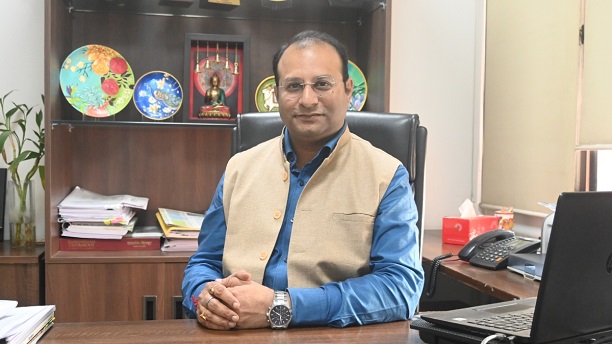Learner’s Park; Anirban Bhattacharya of Seth Anandram Jaipuria Group of Schools on Changing Phase of Education System in India
 Anirban Bhattacharya, vice president of Seth Anandram Jaipuria Group of Schools shares his views on opportunities and challenges of the Indian education system with FE Education Online.
Anirban Bhattacharya, vice president of Seth Anandram Jaipuria Group of Schools shares his views on opportunities and challenges of the Indian education system with FE Education Online.
What is the best thing about today’s education system?
The dynamics of education have changed in recent times. There is a shift from singular stress on academic excellence towards holistic development of learners through a balanced blend of knowledge, skills and values. Educators today are also emphasising on curriculum coherence where subject content is age-appropriate and includes socio-cultural awareness. Institutions are adopting internationalism programmes to create a meaningful global perspective among students. Technology integration in the curriculum has also become quite a norm among many private schools and higher education institutions. The National Education Policy 2020 has also paved the way for transformation in India’s education system and it is good to see a move towards making learning more engaging, integrated and inclusive.
What is the one thing that you would like to change about the education system today?
While there is much that is good about India’s education system, there is also a lot of room for improvement. I think there is a need to ponder on the ‘all-or-nothing-assessment-system’ which is usually adopted in schools or colleges. The high-stakes exams put students in a frenetic race to score more marks or grades. Students are more inclined towards rote memorization rather than developing a deep understanding of concepts. What we need is an assessment system that encourages the development of critical thinking abilities in students. Education has to be about scholastic competence, skill development, sporting excellence, artistic creativity, and problem-solving proficiency. At the same time there has to be a focus on soft skills such as resilience, empathy, and teamwork. We need to expand our horizon in education to make sure that grades aren’t a hindrance to learning.
What is the role digital has played in the evolution of the education system?
Digital has come to play a central role in education. Unlike the past, today’s students are natives of technology. It won’t be wrong if we call them Abhimanyu who had learned all about the ‘chakravyuh’ while in his mother’s womb. Children today are born with a natural aptitude for technology. At a young age, they take to technology with exceptional ease. They are multi-taskers who can literally juggle multiple gadgets. Without doubt, technology has enhanced learning and promoted collaboration, communication between students and teachers. It was a great resort to continue education during the lockdowns caused by the Covid-19 pandemic. Online learning has deeply penetrated global education systems in the last 2-3 years and now we are moving towards blended and self-paced learning formats to complement classroom learning. Beyond this, technology has facilitated access to copious amounts of information at a mere click. It has brought about sweeping changes even in pedagogy. Today, institutions are adopting student-centric flipped classroom learning models. Information and Communications Technology (ICT), Artificial Intelligence, and Virtual Reality technologies are being leveraged to make learning immersive and experiential.
What has been the disadvantage of digital in education?
While technology is a great enabler, it also has its downsides. To begin with, there is always the risk of digital addiction. Over-reliance on technology may hamper the cognitive development of students as well as teachers. Technologies like Chat GPT can be disruptive. There are also issues of privacy and cyber security. Secondly, owing to inadequate digital infrastructure in most of the third-world countries, online education cannot be accessed by the have-nots. This creates a digital learning divide and an inequity in education. Thirdly, e-learning has a disadvantage of not promoting social-emotional development of students. So, we must have the right perspective towards the use of digital technology in education. We have to make sure that technology is a great tool for learning rather than a replacement for classroom education.
What is the career advice that you would like to give to students?
First and foremost, it’s important to understand the significance of lifelong learning in today’s context. Industry 4.0 is perpetually evolving and new jobs that never existed before are being created. According to the World Economic Forum’s ‘Future of Jobs Report’, by the year 2025, about 85 million jobs may be displaced by a shift in the division of labour between humans and machines. About 97 million new roles may emerge that are more adapted to the new division of labour between humans, machines and algorithms. Today’s educators and learners should understand this changing paradigm. Students need 21st century skills of communication, critical thinking, collaboration and creativity. They need to nurture complex problem-solving skills, digital competency, leadership skills, interpersonal skills and global citizenship skills. At the same time, it’s important to be sensitive to the global social-cultural-environmental issues through an adherence to the Sustainable Development Goals. To create a long lasting career, students need more than just competence in a specialty. They need all round knowledge, skills and competencies to be successful leaders and achievers.







